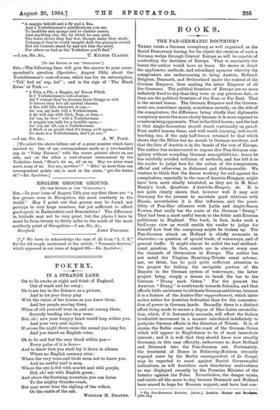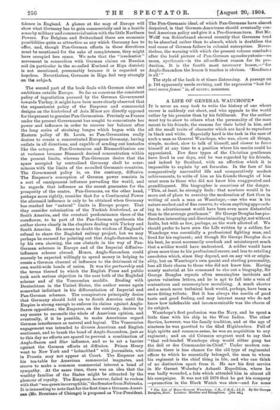THERE exists a German conspiracy as well organised as the
Social Democracy having for its object the creation of such a German wedge through Central Europe as will be capable of controlling the destinies of Europe. That is succinctly the lesson the author would have us learn. He shows in detail the appliances, methods, and subsidiary agencies whereby the conspirators , are endeavouring to bring Austria, Holland, Belgium, Denmark, and Switzerland under the control of the German Emperor, thus making the latter Emperor of all the Germans. The political frontiers of Europe are no more definitely fixed to-day than they were at any previous date, or than are the political frontiers of the Near or Far East. That is the second lesson. The German Emperor and the Govern- ment are, sometimes openly, sometimes secretly, on the side of the conspirators, the difference being chiefly that diplomatic conspiracy moves the more slowly because it is more exposed to countermining opponents. That is the third lesson; and the last is that Anglo-Saxondom should stand continually on guard. Four useful lessons these, and well worth learning, well worth teaching, too, if the only half-lesson retained be that which shows that the Rhine has no mouth in German territory, and that the fate of Austria is in the hands of the rest of Europe. The author has endeavoured to expose this Pan-German con- spiracy without wounding German susceptibilities; hence he has carefully avoided criticism of methods, and has left it to the reader to judge how far the action of the conspirators, official and otherwise, is dishonest and dishonourable. We venture to think that the forces working for and against the conspirators, especially in the case of Austria-Hungary, might have been more clearly tabulated, as they are in M. Ren6 Henry's book, Questions d' Autriche-Hongrie, &c. It is not quite clearly shown that, however well it may suit Germany for the present to maintain good relations with Russia, nevertheless it is Slav influence, and the possi- bility of Pan-Slav alliances with Latin and Anglo-Saxon Powers, that really bar the route of the German " Drang." That had been a most useful lesson to the futile anti-Russian politicians in England. The book, in fact, lacks such a bird's-eye view as would enable the reader to judge for himself how best the conspiracy might be broken up. The Pan-German attack on Holland is chiefly economic in character,—a question of special trade, of waterways, and of general traffic. It might almost be called the real midland- canal question. In fact, canals are in almost every case the channels of Germanism in Europe. The author has not noted the Utopian Hamburg-Trieste canal scheme, nor, we think, has he paid quite sufficient attention to the project for linking the navigable portion of the Danube to the German system of waterways ; the latter project being simply a means to break the bar to the German " Drang nach Osten." For the present the Austrian " Drang " is southwards towards Salonika, and that affords little assistance to ultimate German ambitions, becalm it is a feature of the Austro-Slav rapprochement, which latter makes rather for Austrian federation than for the concentra- tion of power in German hands. Secondly, there is a distinct effort being made to secure a degree of Slav-Latin reconcilia- tion, which, if it fortunately succeeds, will affect the Italian irredentist movement in a manner calculated indefinitely to postpone German efforts in the direction of Trieste. It is, of course, the Baltic coast and the coast of the German Ocean which will appear to Englishmen to be of most immediate interest ; and it is well that they should know how steadily Germany, in this case officially, endeavours to draw Holland and Denmark into the Pan-German net. Fortunately, the treatment of Danes in Schleswig-Holstein (recently exposed anew by the Berlin correspondent of Le Temps) may be expected to react against Danish Germanophil indications, as will doubtless such blundering malevolence as was displayed recently by the Prussian Minister of the Interior against the Poles. Nevertheless, the danger exists, and exists all the more to-day because Denmark and Holland have ceased to hope for Russian support, and have lost con- * The Pan-Germanic Doctrine. [Anon.] London: Harper and 13rothere. [10s. Cxl.]
fidence in England. A glance at the map of Europe will show what Germany has to gain commercially and in a hostile sense by military and commercial union with the little Northern Powers. For Belgium and Switzerland there are economic possibilities quite as attractive as any which Germany has to offer, and, though Pan-German efforts in these directions must be mentioned for the sake of completeness, they might have occupied less space. We note that the " irredentist " movement in connection with German claims on Russian soil (in particular in the so-called Kurland or Riga district) is not mentioned, presumably because it is regarded as hopeless. Nevertheless, Germans in Riga feel very strongly on the subject.
The second part of the book deals with German aims and ambitions outside Europe. So far as concerns the consistent policy of ingratiation pursued by the German Government towards Turkey, it might have been more clearly observed that the expansionist policy of the Emperor and commercial designs on the hinterland of Asia Minor are directly opposed for the present to genuine Pan-Germanism. Precisely as France under the present Government has sought to concentrate her power and influence in order to recover her balance after the long series of straining lunges which began with the Eastern policy of St. Louis, so Pan-Germanism really desires to create a concentrated European Germany, having outlets in all directions, and capable of sending out tentacles like the octopus. Pan-Germanism and Bismarckianism are at variance because Bismarck desired concentration within the present limits, whereas Pan-Germans desire that the space occupied by centralised Germany shall be coter- minous with the limits of the so-called Germanic countries. The Government policy is, on the contrary, diffusive. The Emperor's conception of German power consists in a sort of omnipresent influence pervading the world, and he regards that influence as the surest guarantee for the prosperity of the centre. Pan-Germans, on the other hand, perhaps more rightly, consider that for a Continental Power the aforesaid influence is only to be obtained when Germany has reached her "natural" limits in Europe proper. That they consider colonisation of the Turkish hinterland, as of South America, and the eventual predominance there of the cornflower, to be part of the Pan-German apotheosis the author shows clearly in the chapters dealing with Turkey and South America. He seems to doubt the wisdom of England's refusal to share the Baghdad railway project, but we may perhaps be excused for pointing out that Anglo-Saxondom is, by his own showing, the one obstacle in the way of Pan- German schemes in Europe and of the Imperial diffusive- influence scheme abroad. Hence, Anglo-Saxondom could scarcely be expected willingly to spend money in helping to create a German channel of influence to the detriment of its own world-wide bonds of union. It was the partnership and the terms thereof to which the English Press and public took such serious objection in the case both of the Baghdad scheme and of the Venezuelan muddle. Dealing with Deutschtum in the United States, the author seems again somewhat indistinct in his differentiation of Imperial and Pan-German schemes. The conspirators principally desire that Germany should hold on to South America until the Empire is strong enough to enforce its claims against Anglo- Saxon opposition ; the Emperor, on the contrary, desires by any means to reconcile the whole of American opinion, and eventually, if it be possible, to make Americans regard German interference as natural and logical. The Venezuelan engagement was intended to divorce American and English sentiment, and to break the bond of Anglo-Saxondom, just as to this day no efforts are spared to prevent a combination of Anglo-Saxon and Slav influence, and so to set a barrier against the German efforts at diffusion. Prince Henry went to New York and "hobnobbed" with journalists, who in Prussia may not appear at Court. The Emperor set his tea-table for American commercial 'magnates, and• strove to make a common commercial interest a bond of sympathy. At the same time, there was an idea that the wealthy families of the States might be attracted. by the glamour of royalty. The Emperor. however, failed to reckon with that "sea-green incorruptible," the Senator from Nebraska. It is interesting to note that for the first time a German-Ameri- can (Mr. Brentano of Chicago) is proposed as Vice-President.
The Pan-Germanic ideal, of which Pan-Germans have almost despaired, is that German-Americans should eventually con- trol American policy and give it a Pro-German turn. But Mr. Wolff von Schierbrand showed recently that Germans tend to be absorbed rather than to absorb, which is doubtless the real cause of German failure in colonial enterprises. Never- theless, the warning with which the present volume coneludee after the lurid picture of Pan-German apocolocyntosis—we mean, apotheosis—is the all-sufficient reason for its pro- duction. It is the fourth most necessary lesson,—" for Anglo-Saxondom the lesson it teaches is obvious. Readines3 is all.' " The style of the book is at times distressing. A passage on p. 144 apparently needs revising, and the expression "lust for auri sacra fames" is, of course, nonsense.



































 Previous page
Previous page